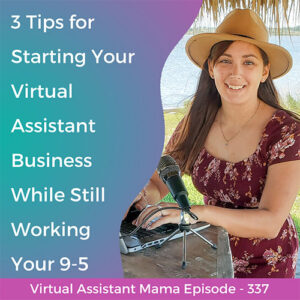
Episode 337: 3 Tips for Starting Your Virtual Assistant Business While Still Working Your 9-5
In this episode of the Virtual Assistant Mama podcast, I’m sharing 3 tips to help you start your Virtual Assistant business while still working your 9-5.
On today’s episode of the Ditch the Classroom podcast, I had the pleasure of chatting with Kara Walker, host of the Money and Mental Peace podcast!
Throughout the episode, Kara breaks down how to budget effectively so that you can quit your job sooner, as well as some juicy budgeting tips!
Make sure to connect with Kara on Instagram @moneyandmentalpeace, her podcast Money and Mental Peace, or her website moneyandmentalpeace.com
AND, don’t forget to grab your copy of “Teacher Turned…” during our pre-sale in order to be entered into our 5-DAY LONG GIVEAWAY which will be taking place February 20-24!
By purchasing your pre-sale copy, you’ll be entered into win ALL 5 DAYS of the giveaway. Head on over to teacherturnedfreelancer.com/book to grab your copy!
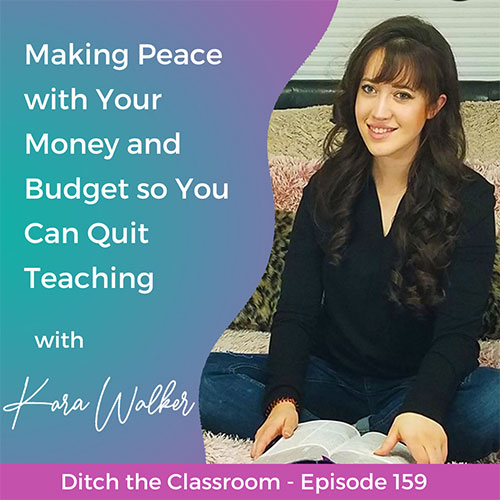
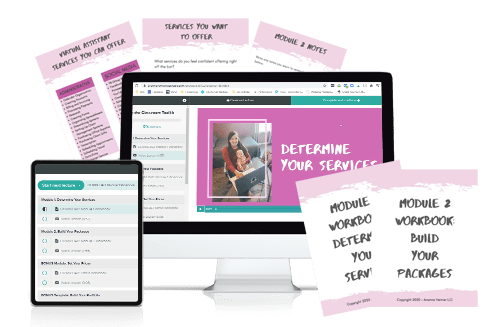
Grab your Ditch the Classroom Toolkit for only $47!
Sign up for the free Virtual Assistant Workshop, the Ditch the Classroom Toolkit, or Teacher Turned Freelancer Academy.
Have any questions for me? Feel free to send me an email at arianna@ariannavernier.com or on Instagram @arianna.vernier! I love chatting with y’all and helping you hit the ground running. Are you ready? Let’s go.
Love,
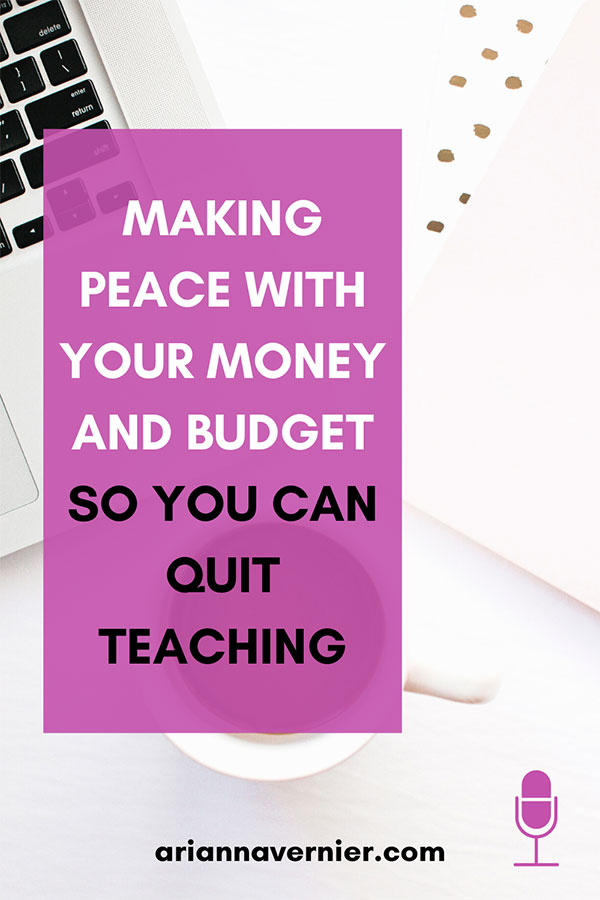
Full Episode Transcription:
Arianna Vernier (00:00):
Y’all. I think one of the biggest things that the women that I talk to struggle with quitting teaching is worrying about their money and their budget and just all the things surrounding that. So today’s episode I brought on Kara Walker. She’s the podcast host of Money and Mental Peace and we break down what budgeting is exactly whether it needs to be stressful. She shares her budgeting tips and just really gives you guys so much information to help ease your mind around this topic. So can’t wait for you to check out today’s episode, but before you do, I just wanna remind you that we are less than a week away from the launch of the Teacher Turned … book. Make sure you grab your pre-sale copy now because that means you will get entered into all five days of our giveaway celebrating the official launch of the book next week, February 20th through 24th. So go grab your copy at teacherturnedfreelancer.com/book. All right y’all, I hope you enjoy today’s episode.
Arianna Vernier (01:14):
Hey Kara, welcome to the Ditch the Classroom podcast. I’m so excited to have you here today.
Kara Walker (02:24):
Thanks for having me. I love connecting with you like in person since like we’ve been emailing and fine, we have so much alike so I’m excited to come on. Thanks.
Arianna Vernier (02:32):
I know I, it’s funny we were just talking before we came on. Kara actually is from Michigan, she’s in the Monroe area and I’m originally from Michigan. We both went to Eastern Michigan University, different years. So we just found that out and that’s kind of cool connecting with someone you’ve never met before and they live just a little bit away. So I would love if you would just kind of share with my listeners a little bit about you before we jump into our topic today.
Kara Walker (03:00):
Yeah, thank you. My name is Kara. Specifically interesting thing about me, you know, regarding what we’re talking about today. I graduated from college debt free. That was my goal cause I didn’t know what I wanted to study at first so I just like, I don’t wanna get a loan for it. But now I did finish school and I’m now a quest to help other students do the same with my podcast money and mental piece. And I also have an online course called the Debt-Free College Blueprint. But I do talk with a lot of homeschool families or like entrepreneurs or just like a variety about budgeting and living that kind of lifestyle. I like to tell people I’m a 20 something Christian entrepreneur, amateur snowboarder and recovering overachiever because you know, life. And I, I really like coming on other podcasts and talking about other topics too. Not just college because I like budgeting, I like goal setting, I like living the debt-free lifestyle. I’m kind of a nerd in that way and I wanna help others do the same. And in relation to your listeners, I’d love to help them feel like they can ditch the classroom faster. Like if they had in mind like well maybe I can do this in a few years. Who knows, maybe your finances are set that you can do it next year. Like wouldn’t that be awesome?
Arianna Vernier (04:12):
Yes, that’s awesome. And this is a topic that’s really close to my heart. I am not a pro at it but my husband and I paid off all of our student loans last year, this year, last year, 2022. Oh sometime the beginning of the year. So yeah, it’s something that has been such a blessing in our life to have that not on our shoulders anymore. So I’m really excited to kind of have you give my listeners some tips on how they could maybe do that too so that they feel more confident with their finances.
Kara Walker (04:44):
Yeah, that would be awesome. I’d love that.
Arianna Vernier (04:47):
I’d like to just ask you if you could tell the listeners what is budgeting, what does that even mean?
Kara Walker (04:54):
I like to tell people that it’s a calendar for your money. So imagine this, you wake up on a Monday morning and you’re looking at the week ahead and you’re like, I have no idea what I’m gonna do with my life and my day and my time. But you work and you have kids and also people need to eat. Like there probably needs to be a calendar for your time. Now you might not be like a hundred percent, you know, every single time is blocked off. But I mean like there’s a general like you kind of need to get to work by a certain time or you kind of need to feed your family or if someone else does the cooking, whatever, there’s semblance of needing to know where your time is going so you don’t wonder where where it went. And I say that that is budgeting, that’s like money if you, if you’re gonna know Christmas is coming up, if you know just you need so much for bills or whatever. So many people live their lives, they have no idea if they have enough to cover. And that is totally stress inducing. And so I like to call a budget a calendar for your money because also people get freaked out that a budget is like they can’t change and so they never will be able to live up to it. And so they don’t even wanna try. Well imagine it’s a Saturday and everyone’s occupied in your family but you had chores or plans to do. But like your best friend from college comes into town unexpectedly that you haven’t seen in years and like there’s a time to change your plans around and see your friend and not like if you were committed to working or I don’t know, there’s, there’s within reason like you can’t cancel your plans but let’s just say it’s like you were gonna do laundry and you can do tomorrow.
Kara Walker (06:31):
You know there’s a time to like change your plans. So I just want people to feel a release on pressure that budgeting, it’s setting out what you think the month is gonna look like in an ideal case but not being pressured. Well it is good to keep your budget but I mean not being pressured, the strategy might not all look the same. What I mean is something comes up, an emergency comes up or something fun comes up and you realize, you know, I probably don’t need that much money for gas so I’m just gonna switch it over to fun money. You can change and be flexible with your budget throughout the month, but it’s just actually writing it down to see where it went, telling your money where to go instead of being at the end of the month and you’re like, where did it all go? I thought I made good money and now I’m even in debt. That is what a budget is and I am all for like keeping the budget. But what I mean is you can keep your calendar commitments but also rearrange things when stuff comes up. And you can do that with a budget too and not be so stressed about it. That’s what a budget is and people do it, handle it differently, but it just tells your money where to go instead of wondering where it went.
Arianna Vernier (07:45):
Yeah, I love that and I think that’s a really good explanation. I actually was telling my husband because he’s kind of against using a planner and I love my planner and so I was telling him, he’s very into like the budgeting and everything. I’m like babe, I heard this awesome quote that budgeting is like a planner. You use a planner to allocate your time but you can move things around if you need to. That’s just like a budget. We plan where our money’s gonna go but if we gotta adjust it we can. So it’s not like when you set a budget you’re so stuck and you can’t be flexible. No, it allows you to be flexible because it allows you to see where you’re spending that income maybe frivolously that you don’t need to and you’re not even like really realizing it. So yeah, it just allows you to be, I think more intentional with what you’re doing.
Kara Walker (08:36):
Love that. It goes opposite if someone, like you said, if someone’s doesn’t want an organized planner but they’re into budgeting, like it’s, it’s the same idea. That’s great. Yeah.
Arianna Vernier (08:45):
Yeah. So a lot of people get get really overwhelmed with like setting up a budget and like how do I even go about that? And it just feels very stressful to a lot of people. I know. My listeners feel like that. So does it really have to be that stressful?
Kara Walker (09:02):
No it doesn’t. Now to clarify the first time you sit down and write out a planner, it might take a few times to know that you had enough time for each thing. So I, if you can give yourself grace to be like and laugh about it like I’m just gonna try this planner this calendar and you know, I’m expecting that it won’t go exactly as planned the first several times because it’s life and you just laugh at it like sure it might not go exactly to plan every time but no it does not have to be so stressful. And if you don’t mind, I’m gonna combine something we were gonna talk about a little later because I think it goes together with it. What a budget can look like is you have all of your income listed at the top of the page and then you subtract expenses, you subtract how much housing is or mortgage or rent or whatever. You subtract food, you subtract blah blah blah blah blah all the way down and you get to zero at the bottom and that’s called a zero based budget. And it doesn’t have to be so stressful because here’s a trick, give yourself padding, wiggle room. I don’t know when people will listen to this. Gas goes up and down but for a round number, let’s say you had $50 set for gas or a hundred dollars set for gas this month, whatever, I don’t know how long you commute or, and if you think you’re gonna spend 50 bucks on gas, give yourself 60. So there’s wiggle room. Like it’s the most exciting thing. I don’t know about you but for me I finished my week and I actually have time left. I got all of my to-do list done, I got all of my life done and my Saturday afternoon is free. Like what happened? Like that’s amazing. I dunno. That makes me happy. So like it can be the same thing with a budget. Like you get to the end of the month and you have a little bit of money left. How amazing is that? And I do encourage you then or whoever listening to reallocate that. I mean you don’t use all your gas money, they’ll get pizza for your family. I mean like still still use it, reallocate it. But what I’m saying is it doesn’t have to be so stressful because you can adjust things as the month goes on. You can give yourself cushion room, give yourself five, ten dollars more than you think you’ll need depending on the the topic and that makes it less stressful. And also people are probably stress about like writing it down, writing it out. And so I wanted to throw out the Every Dollar app that I use.
Kara Walker (11:26):
You can go to everydollar.com and I’m not like an affiliate or anything. I don’t get any money for like telling people this. It’s just what I have used for years. You can go to every dollar.com or the every dollar app you can download and it’s literally right there. You just put your income in at the top, how much you’re planning for each chunk of the month food, you know, gas, clothing, extra things, Christmas paying off debt. And then whenever there’s some sort of purchase, you have your receipt in front of you. Like you sit in the car before you go home, you have your receipt in front of you, you log it in your phone app, it takes 10 seconds and and you’re done and you go home. And it’s such freedom to be like my money is all set where it needs to be and you look at it again mid-month, you look at it again at the end of the month, you kind of readjust if, if you need more money here, less money there and it’s easy. And I think a lot of times people think it’s stressful too cause they wanna keep track of everything or they have to go back and look at their bank statements to see where the money went and no it can just be in their phone. It can take 10 seconds to do it. It might take a little bit at the beginning of the month to set it up or you might need that business meeting, financial meeting sit down with your husband to do it, you know, to make sure you’re all on the same page. But every month it’ll just copy the old month. So like you can adjust it but if you have a pretty consistent like life and income and bills and stuff, it is so easy to just start it up again the next month. So it does not have to be so stressful. And I also tied in the point we were gonna talk about budgeting tips, using everydollar.com for zero based budget is like my goal to advice. So it can totally help you guys and make you feel like you know where your money’s going.
Arianna Vernier (13:13):
Yeah, I love that tip. I think that makes it really easy and accessible for people. I have the engineer husband who made like a pretty complicated spreadsheet and I’ve grown to love it but at the beginning I was like, what even is this? So I like that Every Dollar like makes it simple.
Kara Walker (13:31):
That’s awesome. There’s a time when it’s exciting like anybody listening if you find this fun, like make it complicated if you want but like, like I’m a nerd, I’m like ooh I get to go and look at my budget now. Like I like it now. But do it simple if it stresses you out.
Arianna Vernier (13:44):
Yeah and one tip that I have too is as much as you can try to live like below your means, I think a lot of people spend as much as they make and you mentioned having like all of your money allocated to different things and like getting that total down to zero from like what your income is to what you’re spending. But I just wanna make sure the listeners understand like that doesn’t mean you’re spending all of that. That means some of it might be like savings, some of it might be saving up your spending money for something in the future. You don’t have to like zero out your entire bank account of, of money in there every month.
Kara Walker (14:24):
That’s great to clarify cuz yeah, I’m not talking about zeroing out your bank account and it’s zeroing out the budget. So for me, my budget also includes line items like retirement investments and then taxes for my, let’s say your business budget or virtual assistant whatever there, there’s a section of, you know, you have to save the money to pay it later. You have um, saving for your business. You know, I, I would have saving for Christmas, I’d have a line item so many months before saving for Christmas. So I’m not necessarily zeroing out my bank account but all the money has gone somewhere or, and then personally I have a separate sheet where I’m like okay the money in my bank account, what is it for? Because if you don’t know what it’s for and you are like, ooh, I have $2,000, let’s go on a trip. Like for me some of that is I’m waiting for it to be taken to put into my investments or I’m waiting to donate it and offer it at church or I’m waiting to gather it up and it’s for Christmas and you can adjust that. This is a separate tip. I actually have different accounts in my bank account that I can take from the regular savings and put like this is for you can have a variety. This is for Christmas coming up, this is for future investing once you get started, I don’t know. You are absolutely right. Thank you for clarifying that. It’s not you get all the money outta your bank account, it’s that all the money for that month has gone somewhere and that could still mean has gone to yourself. It could still mean you’re saving it or you’re paying off debt or you’re saving your emergency fund. Thank you for saying that. That’s a very good point to bring up.
Arianna Vernier (16:07):
Yeah. Definitely. Cuz I know that used to confuse me with budgets. I’m like, but what if I don’t wanna spend it all? So I just wanted to clarify that for anybody that felt like I did when I, back when I was confused about it for my listeners, you know, they’re wanting to quit teaching, they want to start working as a virtual assistant so they can be home with their babies more, but maybe they’re scared of losing that, you know, full-time income. How is budgeting going to help them quit their job faster?
Kara Walker (16:33):
Oh my goodness. It’ll help so much for a variety of angles. So my podcast is called Money and Mental Peace. I often talk to college-aged students more so, but let’s take those two angles. First of all, the mental piece of knowing where everything is and where the money is, is phenomenal. Teachers are super stressed. Let, like, let’s be honest here, and I looked into becoming a teacher and I didn’t end up doing it, but there’s so many teachers in my family, like I understand just knowing, having that one less thing. Like do you ever get done at the end of the day and you’re stressed with family, with students, with your work with Christmas is coming up and all this and then you’re like, oh, I don’t know if I have enough money for this or that that I had planned. You know, like that’s just, just an extra thing. Like that’s horrible to feel, knowing where all of it is is kind of like, this is a bit extreme but what have you ever lost your kid in like the grocery store? You know, like you wanna know where stuff is, it makes you have peace of mind, you know where they are. I mean a little more extreme, I’d rather lose some money than lose a kid, but you know what I’m saying? And so there’s such a mental peace that allows you, in my opinion, to think more clearly on other areas of your life to get all, all those other areas in order to get to the point of quitting your job faster. But let’s talk about the money part. So I said money and mental peace. If you know where the money is going, you can project how much you have saved or you have have debt paid off or whatnot. And then you can start looking ahead. Like let’s say I’m one of your listeners and I’m finishing this school year and then I’m hoping to quit my job and go all in with this podcast, right? And hear all the advice that you have to give. But I don’t know if we’ll have enough money in the summer and in the fall and you know, we’re okay with being a little bit less, you know, and living on a little less to get this started. But I just wanna have peace of mind if you budget stuff out, if you learn how to have the habit of a budget, you can look ahead and be like, okay, we’ll have this much income in the summer and then we’ll have this much income in next fall and this is how much our bills are and this is how much we’re saving for Christmas or whatever.
Kara Walker (18:50):
And you can be like, I can do it. Originally maybe you were thinking it would take several years to get to the point of ditching the classroom, but you lay out your budget and you’re like, literally I could do this next year. Like what freedom, what excitement that you could have because you know where that all is specified. So that’s one angle. And then also the other angle is, I don’t know what you go through to teach them for this, but in, in my opinion, there’s more freedom to be able to ditch the classroom if you’ve saved up an emergency fund paid off your debt. And it it, so every dollar.com is Dave Ramsey’s dollar, uh, uh, budgeting app. And so I like his step-by-step. If anyone hasn’t listened, go listen to Dave Ramsey. The order is you save an in initial emergency fund about a thousand dollars for that. Just mental clarity, mental peace as you keep, you know, living your life and paying your bills and all the things. And then as you have your budget, as you have some discretionary funds or you cancel the, I don’t know, Netflix subscription, you never listen or watch, you know, then you start paying that toward debt and you get to the point of paying your debt down. You also, the third step is having a three to six month emergency fund. So even the fact of budgeting and then going through Dave Ramsey’s baby steps of debt being gone and then you have an emergency fund, that’s another step to being like, hey, if you start this virtual assistant business and you’re building it and hypothetically you don’t earn money for a few months, if you have your budget laid out and your emergency funds set up and you have whatever you feel comfortable with, three to six months expenses saved up, you won’t even be lowering your quality of life by taking work off and taking the time to build up this business because you’ll have the money to live on for several months. Like it, it’s just such amazing freedom if you have your money in order and it starts with budgeting and it gets you more money in the long run probably because you could start this business faster and probably build it up and have more freedom and potentially earn more money than you earned teaching while you’re home with your kiddos. And then also have the mental peace that goes with it. Okay, this gets me so excited. Like, I just want you guys to feel free to do whatever you wanna do. Know you have the money, know you have the time, and know you have the emotional bandwidth to be with your family and earn enough money and ditch that classroom. Right? So yeah, that’s my advice.
Arianna Vernier (21:33):
I love that. And I loved your analogy of like, you don’t wanna lose your kid in the grocery store. It made me think we’re getting ready to go to Disney and my husband’s like, I’m gonna get an air tag for our daughter. She’s three to wear on her wrist, so if we lose her we can track her. And you can’t really put an air tag on your money, but that’s what a budget is. You’re air tagging your money, figuring out where it’s going and identifying, you know, where it, where it needs to be.
Kara Walker (21:58):
That’s awesome. Figure out how you can hypothetically air tag your money that that’s what you’re gonna pull from this episode.
Arianna Vernier (22:08):
Cool. So this has been some great advice and I know that my listeners are gonna learn so much more when they come over to your podcast. So thank you so much for coming on. I do wanna ask you my favorite question to ask. I ask it to every guest that comes on the show. If someone wanted to start their Ditch the Classroom journey, but they just felt too overwhelmed, what would you tell them?
Kara Walker (22:29):
I would tell them don’t start at step one, start at step zero, which I know is like a vague answer, but my step zero is do you have consistent time with Jesus every day? And this does not have to be long and it does not have to be, again, this is whole like budget not stressful. Like this doesn’t have to be stressful. What I call consistent God time is a little bit of the Bible, a little bit of prayer every day. It can be in your drive. And to clarify this can be listening to a devotional and prayer is not an exact order of words to speak. Prayer is literally you’re driving to work in the morning and you’re like, Hmm, that is a cool tree, God, I like that tree. Like, and then you’re like, today I’m really worried about this one student I have to deal with, you know, can you help me with that? But also I’m so glad I have, I don’t know, fish sticks for lunch. Like I don’t know what you have for lunch, but literally sometimes when I don’t know what to pray or there’s too much to pray about and you don’t know where to start, I literally look at what’s around me and I’m like, hmm, this is a comfy chair like, like whatever, whatever. Tiny little semblance of like a random thought. If you’re directing it towards God, that’s prayer. And then ending that time, this is gonna be five minutes, 10 minutes, ending that time with I really like want to be following you and I want to try to ditch this classroom. You know, can you give me the enabling power the next steps to do this because I’m already stressed and I don’t even know when I’ll even start to write a budget. You know, like that sort of thing. So like that’s where you get started. You start with step zero and it’s just complete utter honesty and always starting with God first in my opinion. And it can literally be five minutes or 10 minutes or whatever, but the thing is our like spiritual muscles so to speak. You don’t do a hundred pushups in one day that you’ve never done pushups before and then you’re exhausted for weeks. You do two every day and then five every day and then 10 every day. Like you build it up. So if you’re sitting down and doing two hours reading the Bible and talking to God and you don’t do it again for a month or two, you’re not building your muscle. It’s a tiny bit every day. It’s that tiny tear in the muscle. So my opinion not has nothing to do with like money and ditching the classroom and all of that. It’s just literally asking God for help and doing a tiny bit every day and in what you’re already doing. Yeah, driving to work or something or whatever, or at your lunch break or whatever. And then that can give you that. I just feel like that mental space and that God help to be like, okay now God, when do I start this budget how do I start it? Because I wanna see what can happen so I can ditch the classroom faster. And I think you start that journey with God first and asking for help. So that’s my thing.
Arianna Vernier (25:30):
Yes, 100%. I’ve got my book coming out this month, which if you’re listening congrats probably heard about, it’s called Teacher Turned… And we walk through the purpose framework and the first step, that first p is prayer. So that’s the first oh thing cool, you gotta go to, you gotta go to God and have him help you with your decisions. We can’t do it all on our own and when we try, we end up just like driving ourselves crazy. So ask God for help, that’s, I mean, he’s there to be your loving father and to guide you and to show you where he wants you to be and help you figure out your new purpose. So including him is, yeah, like you said, set zero.
Kara Walker (26:10):
I love that. Yes, exactly. We’re on the same page.
Arianna Vernier (26:14):
Yes, definitely. So this has been such a blessing having you on today, Kara. Where can my listeners come and connect with you and become your best friend?
Kara Walker (26:23):
Oh, yay. I I love more friends. Okay. Yeah, so I have a podcast called Money and Mental Peace and I walk through helping college students find God’s path for college and graduate loan and debt free. So there can be some connection point here because it’s really like seeking God’s purpose, purpose for your life. And like, um, well actually you and I have have a similar mentor connector, Stephanie Gass, and she had said this in an episode recently. I love it. And it was sitting in the stillness long enough to have the, I’m gonna butcher this, but to have like the correct direction at the beginning instead of like going here and then going there and then turning here and then turning there. And let me clarify, sometimes God takes us on journeys like that, that go here and there and everywhere, but it’s still that sitting with him first. So we talk about that and then we also talk about budgeting and money and ways to pay for college debt free before you even graduate. Not like having to pay it back later. So, um, yeah, you might like that for your own inspiration around money and God time connection or you might wanna tell, I don’t know, a friend or a sister or your kiddo if you’re, you have kids that age and I also have Instagram @moneyandmentalpeace and moneyandmentalpeace.com. Thank you.
Arianna Vernier (27:43):
Perfect. Yeah, thank you again so much for coming on. It’s been super fun connecting and yeah, y’all go check out Kara’s podcast and I’m gonna be a guest on her show as well, so you can go listen to our chat over there.
Kara Walker (27:57):
Yeah, come listen, I think it’s gonna be out before this one comes out so you can come to my podcast and go back a little bit ways and we’re gonna talk about getting, maybe getting these girls on being VAs beforehand, you know? I love that.
Arianna Vernier (28:12):
Awesome. All right y’all, thank you so much for tuning into today’s episode. I’ll have all the links for Kara’s resources and her podcast and everything for you guys in the show notes so you can get connected with her. And I cannot wait to see you back here on Thursday for our next episode and we’ll see you next time.

In this episode of the Virtual Assistant Mama podcast, I’m sharing 3 tips to help you start your Virtual Assistant business while still working your 9-5.
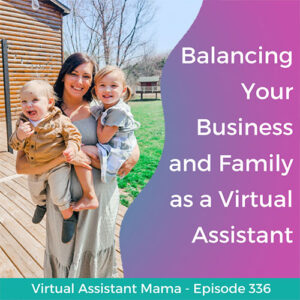
In this episode of the Virtual Assistant Mama podcast, I’m sharing how to balance your business and family life as a Virtual Assistant.
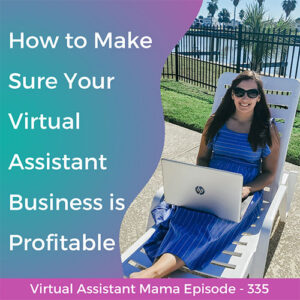
In this episode of the Virtual Assistant Mama podcast, I’m sharing how to make sure your Virtual Assistant business is profitable.